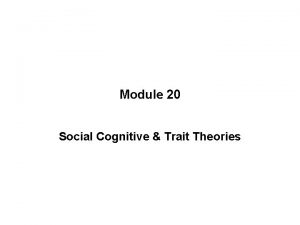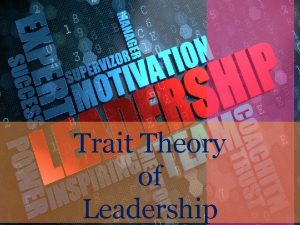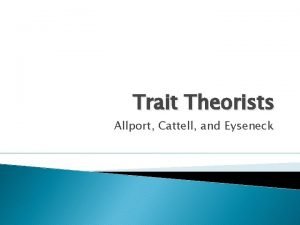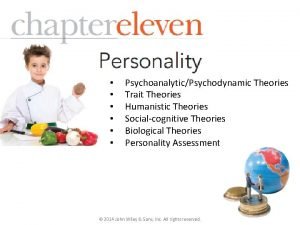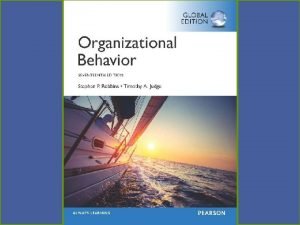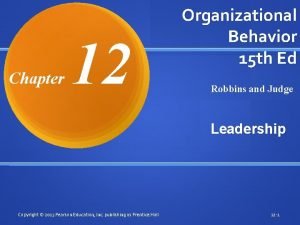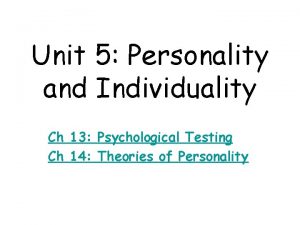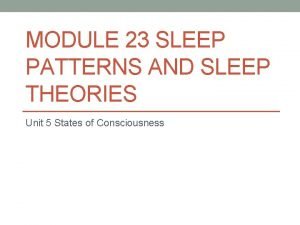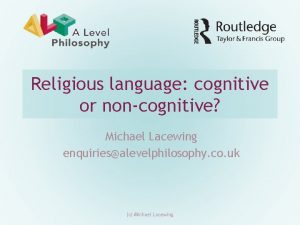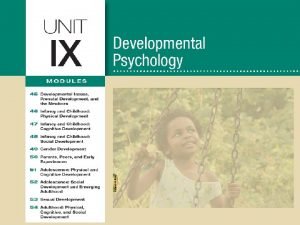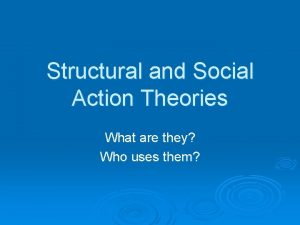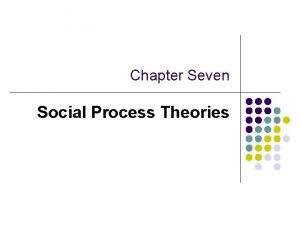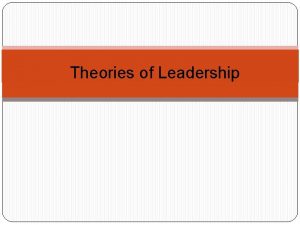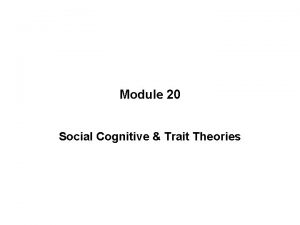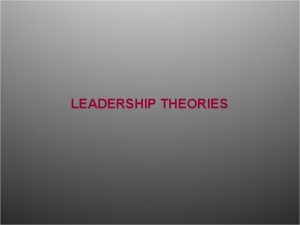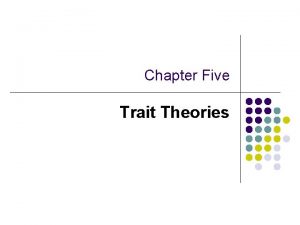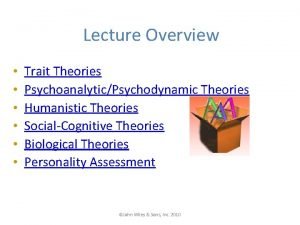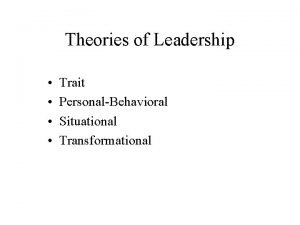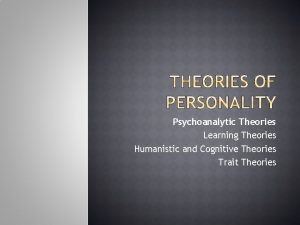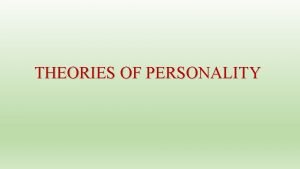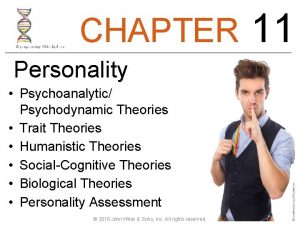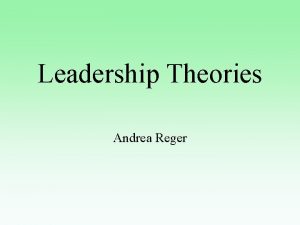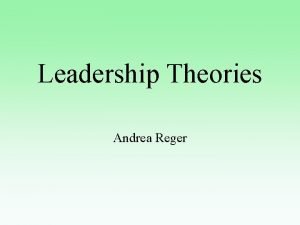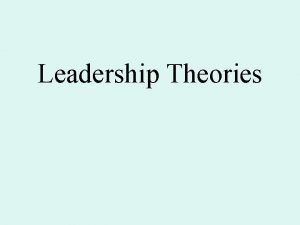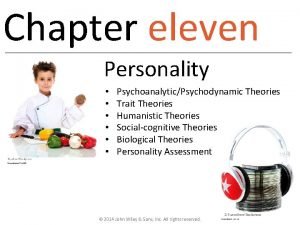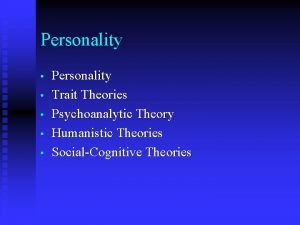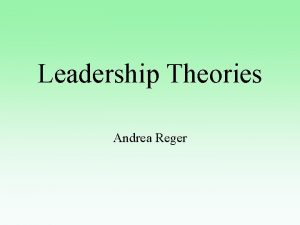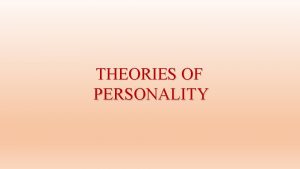Module 20 Social Cognitive Trait Theories SOCIAL COGNITIVE






















- Slides: 22

Module 20 Social Cognitive & Trait Theories

SOCIAL COGNITIVE THEORY • Definition – says that personality development is shaped primarily by three forces: • environmental conditions (learning) • cognitive-personal factors • behavior • all interact to influence how we evaluate, interpret, organize, and apply information

SOCIAL COGNITIVE THEORY (CONT. ) • Interaction of three factors – Cognitive-personal factors • cognitive factors • Include our beliefs, expectations, values, intentions, and social roles • personal factors • include our emotional makeup and our biological and genetic influences – Behaviors • include a variety of personal actions, such as the things we do and say

SOCIAL COGNITIVE THEORY (CONT. ) • Interaction of three factors – Environmental factors • include our social, political, and cultural influences, as well as our particular learning experiences

SOCIAL COGNITIVE THEORY (CONT. )

SOCIAL COGNITIVE THEORY (CONT. ) • Bandura’s social cognitive theory – assumes that personality development, growth, and change are influenced by four distinctively human cognitive processes: – highly developed language ability – observational learning – purposeful behavior – self analysis – Bandura: much of human personality and behavior is shaped by our own thoughts and beliefs

SOCIAL COGNITIVE THEORY (CONT. ) • Four cognitive factors 1. Language ability • powerful tool for processing and understanding information that influences personality development 2. Observational learning • we observe parents, brothers, sisters, peers, friends, and teachers • we learn a great deal

SOCIAL COGNITIVE THEORY (CONT. ) • Four cognitive factors 3. Purposeful behavior • capacity to anticipate events, plan ahead, and set goals influences our personality development, growth, and change 4. Self-analysis • internal process • allows us to monitor our own thoughts and actions • deciding to change our goals or values, we can significantly affect our personality development

SOCIAL COGNITIVE THEORY (CONT. ) • Locus of control – refers to our beliefs about how much control we have over situations or rewards – Internal locus of control • believe that we have control over situations and rewards – External locus of control • believe that we do not have control over situations and rewards and that events outside ourselves (fate) determine what happens

SOCIAL COGNITIVE THEORY (CONT. ) • Delay of gratification – refers to not taking an immediate but less desirable reward and instead waiting and using an object or completing a task that promises a better reward in the future • Self-efficacy – refers to the confidence in your ability to organize and execute a given course of action to solve a problem or accomplish a task – use previous experiences – compare – listen – use feedback

TRAIT THEORY • Definition – an approach for analyzing the structure of personality by measuring, identifying, and classifying similarities and differences in personality characteristics or traits – Trait • relatively stable and enduring tendency to behave in a particular way • Gordon Allport – found 18, 000 terms; out of these 4, 500 were considered to fit definition of personality traits – stable and consistent tendencies in how and individual adjusts to his or her environment

TRAIT THEORY (CONT. ) • Raymond Cattell – took Allport’s list of 4, 500 traits and used factor analysis to reduce the list to the most basic traits – factor analysis • complicated statistical method that finds relationships among different or diverse items and allows them to be grouped together • 35 basic traits Cattell called source traits • describe all differences among personalities

TRAIT THEORY (CONT. ) • Finding traits: big five – Five factor model organizes personality traits and describes differences in personality using five categories • openness • conscientiousness • extraversion • agreeableness • neuroticism

TRAIT THEORY (CONT. )

TRAIT THEORY (CONT. ) • Person Versus Situation – person-situation interaction • person’s behavior results from an interaction between his or her traits and the effects of being in or responding to cues from a particular situation • example: Rush Limbaugh could be righteous in criticizing Jerry Garcia’s drug use while being a drug addict himself

GENETIC INFLUENCES ON TRAITS • Behavioral genetics – study of how inherited or genetic factors influence and interact with psychological factors to shape our personality, intelligence, emotions, and motivation and also how we behave, adapt, and adjust to our environment • Studying genetic influences – Heritability • statistical measure that estimates how much of some cognitive, personality, or behavioral trait is influenced by genetic factors

GENETIC INFLUENCES ON TRAITS • Influences on Personality – one reason for brothers and sisters developing different personalities is: • 50% of their genes are different • 50% are shared – another reason is: • each brother’s or sister’s unique set of genetic factors interacts differently with his or her environment

GENETIC INFLUENCES ON TRAITS • Researchers have broken down the contributions to personality development into the four factors: – 40% genetic factors – 27% nonshared environmental factors – 26% error – 7% shared environmental factors

APPLICATION • Objective personality tests (self-report questionnaires) – specific written statements that require individuals to indicate (example) checking “true” or “false” whether the statements apply to them • Objective personality tests are used in: – business settings – clinical settings

APPLICATION • Integrity Tests – supposed to assess whether individuals have high levels of the trait of honesy – focus on measuring a single personality trait • honesty • Minnesota Multiphasic Personality Inventory-2 – true-false self report questionnaire that consists of 338 statements describing a wide range of normal and abnormal behaviors – measures the personality style and emotional adjustment in individuals with mental illness

APPLICATION • Horoscopes • 78% of women • 70% of men • believe that horoscopes are so correct that they were written especially for them • Reliability and Validity – Barnum principle (Named after P. T. Barnum) • method of listing many general traits so that almost everyone who reads the horoscope thinks that these traits apply specifically to him or her • traits are so general that they apply almost to everyone

APPLICATION • Reliability and Validity – Validity: • tests measures what it claims or is supposed to measure – Reliability: • Consistency – person’s score on a test at one point in time should be similar to the score obtained by the same person on a similar tests later in time
 Module 58 trait theories
Module 58 trait theories Trait theory vs social cognitive theory
Trait theory vs social cognitive theory Trait approaches to leadership
Trait approaches to leadership Allport theory
Allport theory Humanistic theories emphasize
Humanistic theories emphasize Organizational behavior
Organizational behavior Summarize the conclusions of trait theories of leadership.
Summarize the conclusions of trait theories of leadership. Summarize the conclusions of trait theories of leadership
Summarize the conclusions of trait theories of leadership Cum
Cum Age graded theory
Age graded theory Raymond cattell was a psychologist who ________.
Raymond cattell was a psychologist who ________. Example of freud theory
Example of freud theory Module 16 sleep patterns and sleep theories
Module 16 sleep patterns and sleep theories Module 23 sleep patterns and sleep theories
Module 23 sleep patterns and sleep theories Module 23 sleep patterns and sleep theories
Module 23 sleep patterns and sleep theories Cognitive and non cognitive religious language
Cognitive and non cognitive religious language Module 47 infancy and childhood cognitive development
Module 47 infancy and childhood cognitive development Module 47 infancy and childhood cognitive development
Module 47 infancy and childhood cognitive development C device module module 1
C device module module 1 Social action theories
Social action theories Social thinking theory
Social thinking theory Matzas
Matzas Primary vs secondary deviance
Primary vs secondary deviance

